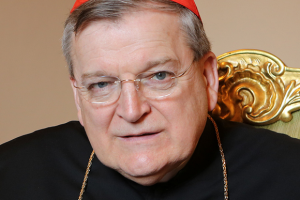May 20, 2019 (LifeSiteNews) – On Monday morning, May 20, Cardinal Raymond Burke gave LifeSite the following interview regarding the situation of Vincent Lambert, whose feeding tube was to be pulled that day. Meanwhile, we have learned that the feeding tube was pulled without Vincent’s family being told.
LifeSite: Your Eminence, you have certainly heard about the case of Vincent Lambert in France, a tetraplegic, brain-damaged man of 42 who is under grave threat of dying in the coming days, unless if last-minute judiciary recourse stops the process, because sanitary and administrative authorities have decided to stop hydrating and feeding him because he has been deemed to be in a so-called “vegetative state” and “would not have wanted to live like this.” This case touches on serious issues regarding the respect due to innocent human life. What is your, or more precisely, what is the Church’s view of this situation?
Cardinal Raymond Burke: I am deeply concerned about the situation of Vincent Lambert, lest he be put to death by omission of nutrition and hydration as tragically happened in the case of Terri Schindler Schiavo in the United States of America on March 31, 2005, and to Eluana Englaro in Italy on February 9, 2009. I am deeply concerned for Vincent Lambert and for the many other victims of euthanasia, for it is clear that, if the withholding of nutrition and hydration is justified in the case of Vincent Lambert, no one who finds himself or herself in a gravely weakened condition will enjoy the fundamental respect for his or her life.
Withdrawing nutrition and hydration, whether it is provided by natural or artificial means, is euthanasia by omission, that is, according to the definition of euthanasia provided by Pope Saint John Paul II, in his Encyclical Letter Evangelium Vitae (25 March 1995): “an action or omission which of itself and by intention causes death, with the purpose of eliminating all suffering” (no. 65). Pope Saint John Paul II, in the same Encyclical Letter, made it clear that the teaching on euthanasia “is based upon the natural law and upon the written word of God” (no. 65).
The first precept of the natural law is the protection and promotion of all human life, especially of human life which is heavily burdened by special needs or grave illness or advanced years.
LifeSite: In the Vincent Lambert case, the French authorities are arguing that his lack self-conscience and of conscience of the world around him – which is in fact disputed, as he reacts to his mother in particular – indicate that he is in a “vegetative state” that he would not have wanted to find himself in. Are these circumstances – vegetative state and the person’s own desire – ever a justification for administering food and water?
Cardinal Burke: The Congregation for the Doctrine of the Faith, in response to two questions regarding the administration of food and water to a person in what is called “a vegetative state” (1 August 2007), gave an authoritative interpretation of the natural law in such cases: “A patient in a ‘permanent vegetative state’ is a person with fundamental human dignity and must, therefore, receive ordinary and proportionate care which includes, in principle, the administration of water and food even by artificial means.” As the response observes: “In this way suffering and death by starvation and dehydration are prevented.” The only exception is the case in which the body can no longer assimilate water or food.
Pope Saint John Paul II illustrated the teaching on the moral duty to provide “normal care due to the sick in such cases,” which includes nutrition and hydration, in his address to Catholic physicians regarding the care of those who are said to be in “a vegetative state” (20 March 2004). He declared: “I should like particularly to underline how the administration of water and food, even when provided by artificial means, always represents a natural means of preserving life, not a medical act. Its use, furthermore, should be considered, in principle, ordinary and proportionate, and as such morally obligatory, insofar and until it is seen to have attained its proper finality, which in the present case consists in providing nourishment to the patient and alleviation of his suffering… The evaluation of probabilities, founded on waning hopes for recovery when the vegetative state is prolonged beyond a year, cannot ethically justify the cessation or interruption of minimal care for the patient, including nutrition and hydration” (no. 4).
LifeSite: Do you think it is correct to apply the words “vegetative state” to a human being?
Cardinal Burke: The term, “a vegetative state,” must be used with great care, for it can lead to … Read more>



You must be logged in to post a comment.